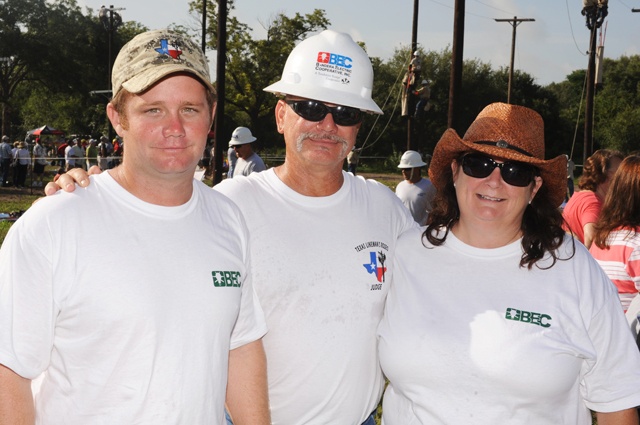Grow ’em, groom ’em and keep ’em.
That’s the mantra of electric cooperative officials statewide as they brace for a brewing storm: a lineworker shortage created by the retirements of veteran linemen and outside employees projected to deplete some co-ops’ ranks by more than 40 percent.
Co-ops know all about bad weather. When the power’s out, electric linemen suit up and show up, braving hurricanes, ice, hail, lightning and any other adverse conditions thrown at ’em. These are not fair-weather kinds of guys.
That same thinking applies to employment: Co-op officials praise linemen for their tenacity and loyalty, saying that once these guys are on board, they rarely jump ship.
“When somebody leaves,” says Steve Horrell, member services manager for Deaf Smith Electric Cooperative, “the next person is here to stay.”
That, in large part, is a credit to Deaf Smith EC’s training philosophy: Maintain an ample applicant pool, pluck only the best and train those apprentices from the ground up. Sure, a lineman might retire every few years or so, but there’s always someone waiting in the wings.
Now, however, the storyline is changing, not only for Texas’ co-ops, but for the nation’s utilities as a whole: According to Carnegie Mellon University’s Electricity Industry Center, about half of the nation’s 400,000 power industry workers are eligible to retire over the next five to 10 years. Deaf Smith EC could lose five—all crew foremen—of its 16 journeyman linemen to retirement by 2021.
You could call it the perfect storm: the confluence of retiring baby boomers—the first wave was born immediately after World War II, just as the electric power industry was emerging—with the demands of a rapidly growing and changing energy industry.
So for co-ops, the race is on to beat the storm—to shore up lineman ranks now and explore all training and recruiting possibilities.
At Deaf Smith EC, tucked high in the Panhandle southwest of Amarillo, that means coordinating plans with Amarillo College, whose regents have approved the start of a utility power-worker training program for the fall 2011 semester. The program has received final approval from the Texas Higher Education Coordinating Board. Ultimately, as academic components are added, the program is designed to offer a full associate’s degree. But its immediate purpose is to train linemen to construct and maintain wind-power transmission lines in this regional hotbed of renewable-energy development.
Hereford-based Deaf Smith EC plans to hire summer interns from the program, Horrell says, giving them a taste of co-op life.
Meanwhile, more than 480 miles to the southeast in the Hill Country, Medina Electric Cooperative officials are carefully monitoring their training investments as they anticipate the retirements of 18 lineworkers—including crew foremen, linemen and field personnel—over the next decade. The retirements would deplete the co-op’s lineworker ranks by 33 percent.
Bill Moffett, the co-op’s safety coordinator and manager of employee development, says Hondo-based Medina EC spends an average of $250,000 on wages and formal training to develop a journeyman lineman. “Once we get ’em trained, we sure don’t want to lose ’em,” Moffett says, noting the co-op’s goal of developing a journeyman lineman within five years.
To that end, more Texas colleges are offering electrical lineman training. In fall 2010, Austin Community College partnered with six Hill Country utilities, including Bluebonnet and Pedernales electric cooperatives, to develop the curriculum for a utility lineworker associate degree program.
Southwest of San Antonio, in Uvalde, Southwest Texas Junior College introduced a lineman-training program that attracted 10 students for the inaugural 12-week class that started in May 2010.
One of those students, Scott Downum, landed a job with Rio Grande Electric Cooperative about four months later in the co-op’s apprentice program.
In July 2010, a few weeks before he was hired, Downum stood watching the Texas Lineman’s Rodeo near Seguin with his mother, Angie Downum. His father, Bandera Electric Cooperative First-Class Lineman Brad Downum, normally competes in the rodeo, but this year was working as an event judge just a few feet away.
Scott, wearing a white, long-sleeved Bandera EC shirt that read “Born To Climb” on the back, said he hoped to follow his dad and grandfather up the family lineman tree. His grandfather, the late Bill Downum, started climbing cedar poles as a telephone lineman in the 1940s.
A lineman career sounded good, his mother said, explaining that she worried constantly about Scott when he served U.S. Marine tours in Japan and Iraq in 2005 and 2006-07, respectively.
The most terrifying moment came in Iraq, in 2007, when Scott was manning the gun turret atop a Humvee struck by a roadside bomb. He suffered a concussion and lost some hearing in his right ear.
Following a separate incident that same year, Downum, who was part of a Marines operation attached to an Army unit, received an Army Commendation Medal for defending a Marines truck convoy against a sniper.
Now Scott is safely home, much to the relief of his mother. “Boots on the ground,” she says of her military son, a father of three who turns 26 on June 21. “I like this better: Boots on the pole suits me just fine.”
It suits Scott just fine, too, who’s aware that a tough guy like him will always be needed in an electric lineman industry facing critical shortages.
Is he up for the challenge? “Hard is relative,” says this redheaded Marine.
——————–
Camille Wheeler, associate editor

